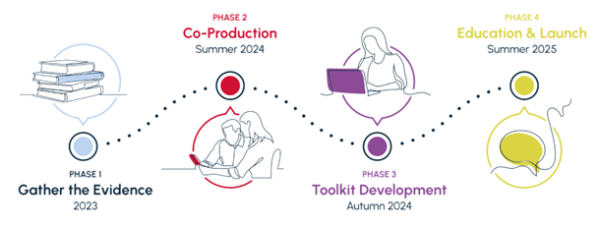The Female Veterans’ Transformation Programme wants to work with you
Heads up! We have launched our consultation & co-production phase and want to tell you what it is all about.

Over the last few years lots of work and academic research has been conducted on the challenges female veterans face as a result of their time in the Armed Forces. However, we recognise that we need to now use this research as a basis to take action and make improvements so women get the right support at the right time and in a way that matters to them.
Our new website is a one stop shop for finding out about our programme and how you can get involved (www.fvtp.org.uk) including signing up to our newsletter. We pulled together the key themes of the research in an Evidence Review and Statement of Need, available on the website, but now want to hear from you to help us codesign a toolkit to support service improvement across the sector
- What are the solutions?
- How do we improve things?
- What is currently working well?
- What needs to change and how does it need to change?
You are the experts, and we need to hear your views and opinions.
We also need to make sure that these improvements are across ALL services, not just veteran specific organisations. How do we raise awareness and educate professionals such as GP’s, social services, hospital staff, leisure services, employers etc?
But this isn’t about focusing on what’s wrong, we also want to celebrate what is currently working well and where good practice exists. How can we share this and demonstrate how to do things well?
We know that you have probably been asked for your opinions and views A LOT and may feel like there is ‘no point’ or ‘no-one ever listens’, so we are committed to letting you know what we did with your feedback. We will produce a ‘you said…..we did’ response to the co-production which will eventually be available on our website for you to see and to check we listened.
This co-production will take place in 3 stages. Firstly, we are asking as many female veterans as possible and services that support them to complete our online questionnaire (fvtp.org.uk/get-involved).
Once we have these back, we will then pull together the key themes and take these to a series of focus groups that we plan to hold from June onwards, both online and face to face, across the UK. The focus groups will help us create the main sections and criteria of the toolkit – setting out the self-assessment section which identifies ‘what you need to do to provide good services for female veterans’. You can sign up to register your interest in taking part in a focus group on the website too (fvtp.org.uk/get-involved).
Recognising that we don’t have the capacity to meet with everyone (and that many of you have already given your time to contribute to focus groups elsewhere), we will also be incorporating input from the reports of focus groups already conducted by other organisations and asking those running focus groups over the next few months to ask questions on our behalf.
If you have a recent focus group report about the experiences of female veterans then please send it our way. If you are running focus groups or having an informal gathering of female veterans for a coffee and you might be able to incorporate our questions, we have set up a facilitator’s pack (fvtp.org.uk/get-involved) which will guide you through different ways in which you could do this.
It is great to be working collaboratively with so many other networks and organisations including the Female Veterans Alliance; WRAC Association; Salute Her; The V Word; Association of WRNS; WAAF/WRAF/RAF(W) Assn; RAF Association; NHS Op Courage; the Defence Garden Scheme and many more. We are looking forward to making many new connections too so please get in touch.
Beyond the focus groups we will move into the third phase of the overall transformation programme by testing and changing the toolkit based on feedback from women veterans and those that support them, with the final version being available in the last stage of the project.
Your opinion matters so any information you can provide will go a long way to helping other female veterans in the future.
